Compassion is Not Easy

Compassion, not in the sense of pity or plain empathy, but what in the striving eventually points to Eastern Enlightenment.
Especially important for understanding this text is knowing what I exactly mean by Compassion. Please make sure to read Compassion, Basically before going further.
The mind in healthcare
Compassion is crucial for psychotherapy because of conceptualized methodologies’ little (or no?) effectiveness. What openly works in psychotherapy is non-specific ― not conceptually distinct in methodology. Because the open aspect is incompatible with the quintessential placebo (the ‘dummy pill’), this leaves the therapist-as-total-person as the primary effective factor.
The same applies to anywhere the mind is relevant in healthcare, including psychosomatics and mental coaching. This indicates a future of mental healing in which Compassion plays a central role. In psychotherapy, the notion of the exceedingly effective ‘therapeutic wizard’ probably points to this.
What Compassion is not ― although it may seem to be.
The following distinctions are not straightforwardly clear to all, even foregoing semantic issues. One may need to delve into related complexities:
All three are interesting and worthy by themselves. Nevertheless, in my sense of using the concepts, only Compassion optimally reaches the ability to help many people ― including oneself. This is even more the case in an environment where people actively come to seek help.
Compassion is art and science.
Science brings together Compassion and subconceptual processing in the mind/brain.
See: Is Compassion Art?
Although everyone can put some steps in art or science, a long and winding path can be travelled in both directions. Without disrespect, many deem themselves to be further on one of them (or both) than can be conceivably acknowledged.
This is even more the case with Compassion pointing to Eastern Enlightenment. In this regard, one may see oneself on a ladder of Enlightenment. For sure, there is a progression of human growth. Without it, no striving would make any sense. But the actual worthiness is in the striving itself, much more than in the place on the ladder. You may recognize a higher-up by his modesty, as in not showing where he stands unless this helps you. Otherwise, he’s just the guy on a bus (or a Himalayan monastery).
How do you know where you are on this ladder? You don’t. Even so, one not seldomly encounters the following assertion.
“Caregivers are already Compassionate by nature.”
Hm. For one who likes the symbolism, Buddha-nature might be present in every sentient being but realizing it – making it effectively real – is a different matter.
What is present in many is hardly the end of the path. It is not even necessarily on the path. Even ‘helping people’ in the sense of ‘me helping you’ can be very ego-oriented in the ‘me’ and the ‘you.’ Since Compassion does not occur without ego-transcendence, that kind of ‘helping people’ is not the subject of this text.
Note that Eastern Enlightenment is not seen as something easy but the result of much hard and long work of meditation and building insight. There is some rightful disdain for anxious easy-goers.
The Eastern concept of Emptiness
Grasping Emptiness (with capital C) at least a bit is beneficial in this regard. It is, in a fundamental sense, the opposite of being conceptually empty (little c) although it may help to ‘empty the teacup.’
Of course, this puts one in a meditative direction. With proper support, this is interesting for any healthcare provider, for whom it can make a huge difference in East and West alike.
Support?
In my view and experience, it is possible to support people in cultivating Compassion. I see two directions of support:
- Experiential: in meditation, be it on a cushion, by dancing or by traveling. In the end, not formal meditation is crucial, but the meditative stance which can be realized in many ways ― including everyday life. Formal meditation may be one more help toward this. Also experiential is a teacher’s example ― teaching-by-overlap. For an AURELIS coach already being on this path, any coachee can be a perfect teacher.
- Procedural: not in providing yet another set of instruments for ‘me helping you,’ but in what can help the provider to make an ever-better instrument of himself.
AURELIS procedural support toward Compassion
This needs to be taken with a huge dose of prudence. The above distinctions (empathy, altruism, love) are painstakingly important. Also, any ego will see any instrument as its own for use. The fundamental aim is the contrary: not the ego-using, but the ego-being-used ― respectfully and with the clear message that ego-humility is necessary. That’s the deal. The ego should be an open gate, not a closed door.
If you are ready for this deal, you can read about some AURELIS coaching techniques. Even so, please see them as nothing but invitations for you to grow from the inside out.
If you experience this, and you feel ready to grow towards an AURELIS coach, please let us know.


